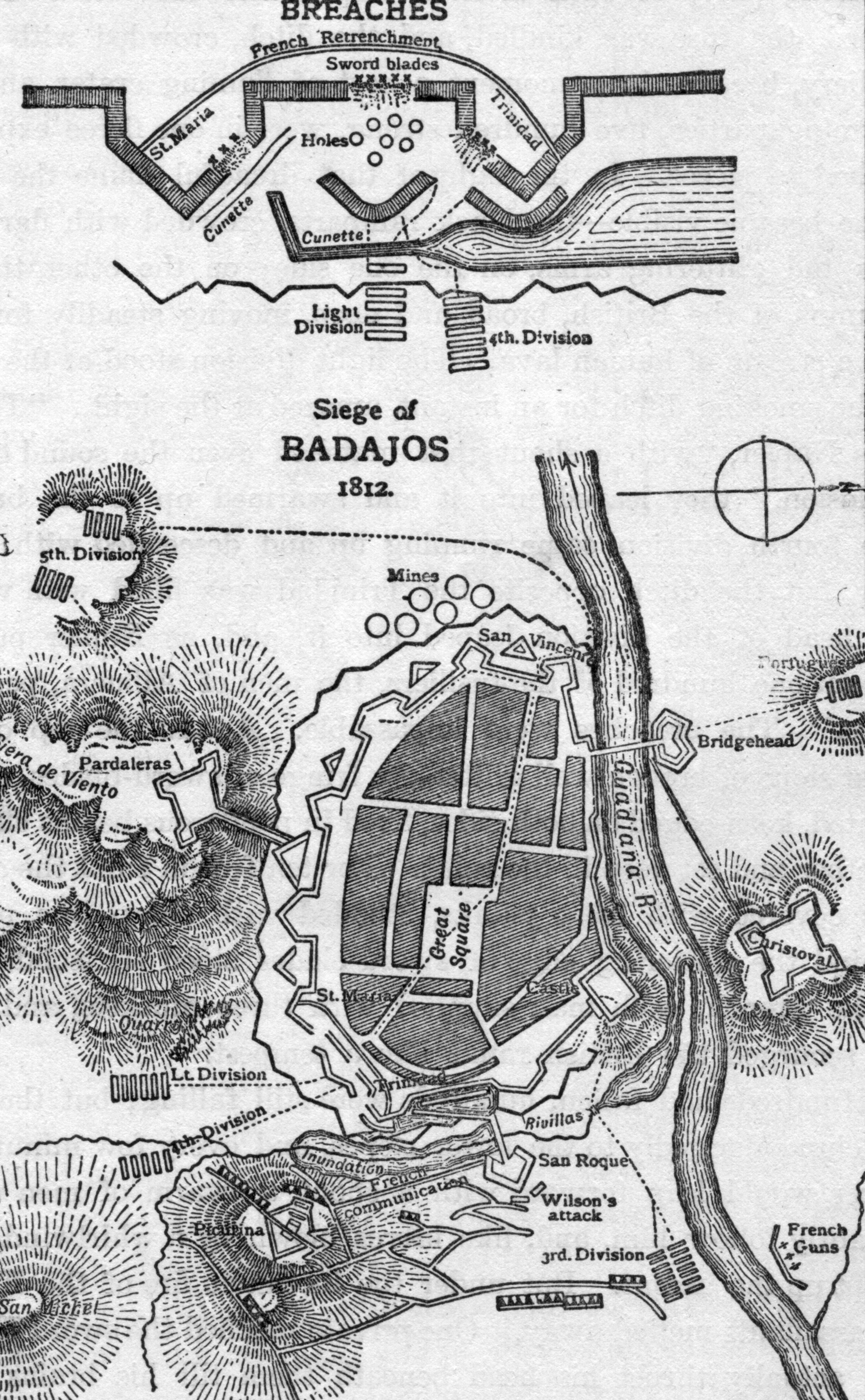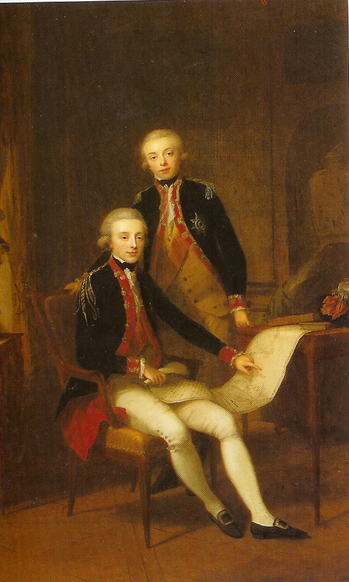|
Miguel Ricardo De Álava
Miguel Ricardo de Álava y Esquivel (7 July 1770 – 14 July 1843) was a Spanish general and statesman who served as Prime Minister of Spain in 1835. He was born in the Basque Country, at Vitoria-Gasteiz, in 1770. Álava holds the distinction of having been present at both Trafalgar and Waterloo, fighting against the British at the former and with them at the latter. Alava served as a naval aide-de-camp during the time of Spain's alliance with France but switched sides in 1808 when Napoleon invaded Spain. The Spanish Cortes appointed him commissary (military attaché) at the British Army Headquarters, and Wellesley, the future Duke of Wellington, who regarded him with great favour, made him one of his aides-de-camp. Before the close of the campaign, he had risen to the rank of brigadier-general. During the Waterloo Campaign in 1815, Alava was the Spanish ambassador to The Hague at the court of King William I of the Netherlands, which allowed him to attend the Duchess of Ric ... [...More Info...] [...Related Items...] OR: [Wikipedia] [Google] [Baidu] |
Prime Minister Of Spain
The prime minister of Spain, officially president of the Government (), is the head of government of Spain. The prime minister nominates the Spanish government departments, ministers and chairs the Council of Ministers (Spain), Council of Ministers. In this sense, the prime minister establishes the Government of Spain, Government policies and coordinates the actions of the Cabinet members. As chief executive, the prime minister also advises the Monarchy of Spain, monarch on the exercise of their royal prerogatives. Although it is not possible to determine when the position actually originated, the office of prime minister evolved throughout history to what it is today. The role of prime minister (then called Secretary of State) as president of the Council of Ministers, first appears in a royal decree of 1824 by King Ferdinand VII of Spain, Ferdinand VII. The current office was established during the reign of Juan Carlos I, in the Constitution of Spain, 1978 Constitution, which ... [...More Info...] [...Related Items...] OR: [Wikipedia] [Google] [Baidu] |
Siege Of Badajoz (1812)
In the siege of Badajoz (16 March – 6 April 1812), also called the third siege of Badajoz, an Anglo-Portuguese Army under the command of the Arthur Wellesley, 1st Duke of Wellington, Arthur Wellesley, the Earl of Wellington (who was later made Duke of Wellington) besieged Badajoz, Spain, and forced the surrender of the First French Empire, French garrison. The siege was one of the bloodiest in the Napoleonic Wars and was considered a costly victory by the British, with some 4,800 Allied soldiers killed or wounded in a few short hours of intense fighting during the storming of the breaches as the siege drew to an end. Enraged at the huge number of casualties they suffered in seizing the city, the troops broke into houses and stores consuming vast quantities of alcohol with many of them then going on a rampage, threatening their officers and ignoring their commands to desist, and even killing several. It took three days before the men were brought back into order. When ord ... [...More Info...] [...Related Items...] OR: [Wikipedia] [Google] [Baidu] |
William I Of The Netherlands
William I (Willem Frederik; 24 August 1772 – 12 December 1843) was King of the Netherlands and List of monarchs of Luxembourg, Grand Duke of Luxembourg from 1815 until his abdication in 1840. Born as the son of William V, Prince of Orange, the last stadtholder of the Dutch Republic, and Wilhelmina of Prussia, Princess of Orange, Wilhelmina of Prussia, William experienced significant political upheavals early in life. He fought against the French invasion during the Low Countries theatre of the War of the First Coalition, Flanders campaign, and after the Batavian Revolution in 1795, his family went into exile. He briefly ruled the Principality of Nassau-Orange-Fulda before Napoleon's French troops' occupation forced him out of power. Following the defeat of Napoleon in 1814, William was invited back to the Netherlands, where he proclaimed himself Sovereign Prince of the United Netherlands. In 1815, William raised the Netherlands to a kingdom and concurrently became the gran ... [...More Info...] [...Related Items...] OR: [Wikipedia] [Google] [Baidu] |
Waterloo Campaign
The Waterloo campaign, also known as the Belgian campaign (15 June – 8 July 1815) was fought between the French Army of the North (France), Army of the North and two War of the Seventh Coalition, Seventh Coalition armies, an Anglo-allied army and a Prussian army. Initially the French army had been commanded by Napoleon Bonaparte, but he left for Paris after the French defeat at the Battle of Waterloo. Command then rested on Marshals Marshal Soult, Soult and Marshal Grouchy, Grouchy, who were in turn replaced by Marshal Davout, who took command at the request of the French Provisional Government. The Anglo-allied army was commanded by the Duke of Wellington and the Prussian army by Gebhard Leberecht von Blücher, Field Marshall Graf von Blücher. The war between France and the Seventh Coalition came when the other European Great Powers refused to recognise Napoleon as Emperor of the French upon his return from exile on the Principality of Elba, island of Elba, and declared war ... [...More Info...] [...Related Items...] OR: [Wikipedia] [Google] [Baidu] |
Duke Of Wellington
Duke is a male title either of a monarch ruling over a duchy, or of a member of royalty, or nobility. As rulers, dukes are ranked below emperors, kings, grand princes, grand dukes, and above sovereign princes. As royalty or nobility, they are ranked below grand dukes and above or below princes, depending on the country or specific title. The title comes from French ''duc'', itself from the Latin '' dux'', 'leader', a term used in republican Rome to refer to a military commander without an official rank (particularly one of Germanic or Celtic origin), and later coming to mean the leading military commander of a province. In most countries, the word ''duchess'' is the female equivalent. Following the reforms of the emperor Diocletian (which separated the civilian and military administrations of the Roman provinces), a ''dux'' became the military commander in each province. The title ''dux'', Hellenised to ''doux'', survived in the Eastern Roman Empire where it continued in se ... [...More Info...] [...Related Items...] OR: [Wikipedia] [Google] [Baidu] |
Military Attaché
A military attaché or defence attaché (DA),Defence Attachés ''Geneva Centre for the Democratic Control of Armed Forces (DCAF)'' sometimes known as a "military diplomat",Prout, John. THE ORIGINS OF THE MILITARY ATTACHÉ CORPS " ''American Intelligence Journal'' 21, no. 1/2 (2002): 47–55. is an responsible for matters within a [...More Info...] [...Related Items...] OR: [Wikipedia] [Google] [Baidu] |
Napoleon
Napoleon Bonaparte (born Napoleone di Buonaparte; 15 August 1769 – 5 May 1821), later known by his regnal name Napoleon I, was a French general and statesman who rose to prominence during the French Revolution and led Military career of Napoleon, a series of military campaigns across Europe during the French Revolutionary and Napoleonic Wars from 1796 to 1815. He led the French First Republic, French Republic as French Consulate, First Consul from 1799 to 1804, then ruled the First French Empire, French Empire as Emperor of the French from 1804 to 1814, and briefly again in 1815. He was King of Italy, King of Kingdom of Italy (Napoleonic), Italy from 1805 to 1814 and Protector of the Confederation of the Rhine, Protector of the Confederation of the Rhine from 1806 to 1813. Born on the island of Corsica to a family of Italian origin, Napoleon moved to mainland France in 1779 and was commissioned as an officer in the French Royal Army in 1785. He supported the French Rev ... [...More Info...] [...Related Items...] OR: [Wikipedia] [Google] [Baidu] |
Vitoria-Gasteiz
Vitoria-Gasteiz (; ; also historically spelled Vittoria in English) is the seat of government and the capital city of the Basque Country (autonomous community), Basque Country and of the provinces of Spain, province of Álava in northern Spain. It holds the autonomous community's Basque Parliament, House of Parliament, the headquarters of the Government, and the Lehendakari, Lehendakari's (Prime Minister's) official residency. The municipality—which comprises not only the city but also the mainly agricultural lands of 63 villages around—is the largest in the Basque Country, with a total area of , and it has a population of 261,494 (January 2025). The dwellers of Vitoria-Gasteiz are called ''vitorianos'' or ''gasteiztarrak'', while traditionally they are dubbed ''babazorros'' (Basque language, Basque for 'bean sacks'). Vitoria-Gasteiz is a dynamic city with strengths in healthcare, aeronautics, the automotive industry, and viticulture. It is the first Spanish municipality to be ... [...More Info...] [...Related Items...] OR: [Wikipedia] [Google] [Baidu] |
Basque Country (autonomous Community)
The Basque Country or Basque Autonomous Community (), also officially called Euskadi (), is an Autonomous communities of Spain, autonomous community in northern Spain. It includes the Basque provinces of Álava, Araba, Biscay, Bizkaia, and Gipuzkoa. It surrounds two enclaves called Treviño enclave, Treviño (Province of Burgos, Burgos) and Valle de Villaverde (Cantabria). The Basque Country was granted the status of ''Nationalities and regions of Spain, nationality'', attributed by the Spanish Constitution of 1978. The autonomous community is based on the Statute of Autonomy of the Basque Country, a foundational legal document providing the framework for the development of the Basque people on Southern Basque Country. Parallelly, Navarre, which narrowly rejected a joint statute of autonomy in 1932, was granted a separate chartered statute in 1982. Currently there is no official capital in the autonomous community, but the city of Vitoria-Gasteiz, in the province of Álava, is ... [...More Info...] [...Related Items...] OR: [Wikipedia] [Google] [Baidu] |
Politician
A politician is a person who participates in Public policy, policy-making processes, usually holding an elective position in government. Politicians represent the people, make decisions, and influence the formulation of public policy. The roles or duties that politicians must perform vary depending on the level of government they serve, whether Local government, local, national, or international. The ideological orientation that politicians adopt often stems from their previous experience, education, beliefs, the political parties they belong to, or public opinion. Politicians sometimes face many challenges and mistakes that may affect their credibility and ability to persuade. These mistakes include political corruption resulting from their misuse and exploitation of power to achieve their interests, which requires them to prioritize the public interest and develop long-term strategies. Challenges include how to keep up with the development of social media and confronting biase ... [...More Info...] [...Related Items...] OR: [Wikipedia] [Google] [Baidu] |
Battle Of Waterloo
The Battle of Waterloo was fought on Sunday 18 June 1815, near Waterloo, Belgium, Waterloo (then in the United Kingdom of the Netherlands, now in Belgium), marking the end of the Napoleonic Wars. The French Imperial Army (1804–1815), French Imperial Army under the command of Napoleon, Napoleon I was defeated by two armies of the Seventh Coalition. One was a United Kingdom of Great Britain and Ireland, British-led force with units from the United Kingdom of Great Britain and Ireland, United Kingdom, the United Kingdom of the Netherlands, Netherlands, Kingdom of Hanover, Hanover, Duchy of Brunswick, Brunswick, and Duchy of Nassau, Nassau, under the command of field marshal Arthur Wellesley, 1st Duke of Wellington, Arthur Wellesley, Duke of Wellington. The other comprised three corps of the Kingdom of Prussia, Prussian army under Field Marshal Gebhard Leberecht von Blücher, Blücher. The battle was known contemporaneously as the ''Battle of Mont-Saint-Jean, Belgium, Mont Saint ... [...More Info...] [...Related Items...] OR: [Wikipedia] [Google] [Baidu] |






